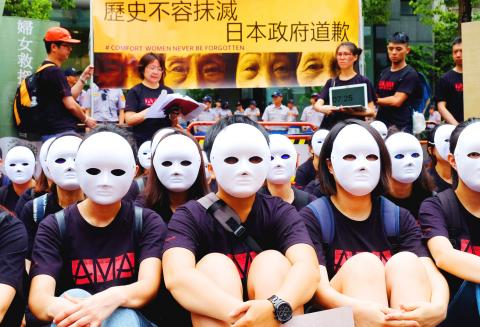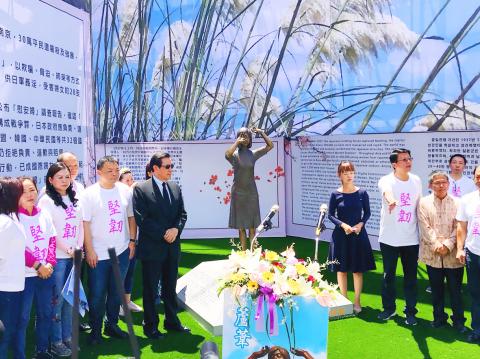About 100 protesters from a coalition of non-governmental organizations yesterday protested outside the Japan-Taiwan Exchange Association in Taipei, demanding that the Japanese government apologize again to surviving Taiwanese “comfort women” and provide them with compensation.
About 2,000 Taiwanese women were estimated to have been forced into sexual slavery by the Imperial Japanese Army during World War II, and the Taipei Women’s Rescue Foundation located 59 survivors after it set up a hotline in 1992, foundation chief executive Fan Ching (范情) said.
“Only two of them remain today and neither were able to attend this demonstration because of their advanced age,” she said.

Photo: Sam Yeh, AFP
Instead, 59 people clad in black and wearing white masks sat silently next to a paper wall printed with the names of the comfort women they represented.
As in its previous protests, the foundation demanded that Japan’s prime minister apologize to the former comfort women on behalf of the Japanese government and provide them compensation.
It also urged the Japanese government to release all documents related to comfort women, initiate an investigation into their history and educate the public about sexual slavery.

Photo: CNA
“To better protect women’s rights and prevent similar things from happening again, the history must be included in Japanese textbooks,” Fan said, adding that until a Japanese prime minister apologizes, the foundation would its annual protests.
The Japanese government should build a museum commemorating the history of comfort women in Japan to educate the public about it, foundation chairwoman Huang Shu-ling (黃淑玲) said.
The foundation has repeatedly invited Japanese Prime Minister Shinzo Abe to visit the AMA Museum in Taipei’s Datong District (大同), which it founded in 2016 to document the history of the comfort women, she said.
No Japanese official has ever visited it, but many Japanese tourists and journalists have, she said.
“Do not underestimate the power of this movement for comfort women. It is the power of women in Asia and around the world who are standing in solidarity to demand human rights,” Huang said.
Over the past several decades, campaigns calling for justice for comfort women have evolved from a local movement to a global one, with the ultimate goal being to end sexual violence, she said.
“Although survivors age and pass away, the movement will not die, because their influence will continue to grow as more young people join in, bringing with them new momentum,” she said.
In Tainan, the Chinese Nationalist Party’s (KMT) Tainan chapter and the Tainan Association for Comfort Women’s Rights yesterday unveiled the nation’s first bronze statue of a comfort woman
At the ceremony, former president Ma Ying-jeou (馬英九) urged the Japanese government to formerly apologize to Taiwanese comfort women and provide compensation.
Aug. 14 has become a day to remember comfort women in Taiwan and South Korea because on Aug. 14, 1991, South Korean Kim Hak-sun became the first former comfort woman to give public testimony about her experience.
Additional reporting by Wang Chun-chung

Taiwan is stepping up plans to create self-sufficient supply chains for combat drones and increase foreign orders from the US to counter China’s numerical superiority, a defense official said on Saturday. Commenting on condition of anonymity, the official said the nation’s armed forces are in agreement with US Admiral Samuel Paparo’s assessment that Taiwan’s military must be prepared to turn the nation’s waters into a “hellscape” for the Chinese People’s Liberation Army (PLA). Paparo, the commander of the US Indo-Pacific Command, reiterated the concept during a Congressional hearing in Washington on Wednesday. He first coined the term in a security conference last

Prosecutors today declined to say who was questioned regarding alleged forgery on petitions to recall Democratic Progressive Party (DPP) legislators, after Chinese-language media earlier reported that members of the Chinese Nationalist Party (KMT) Youth League were brought in for questioning. The Ministry of Justice Investigation Bureau confirmed that two people had been questioned, but did not disclose any further information about the ongoing investigation. KMT Youth League members Lee Hsiao-liang (李孝亮) and Liu Szu-yin (劉思吟) — who are leading the effort to recall DPP caucus chief executive Rosalia Wu (吳思瑤) and Legislator Wu Pei-yi (吳沛憶) — both posted on Facebook saying: “I

A court has approved Kaohsiung prosecutors’ request that two people working for Democratic Progressive Party (DPP) Legislator Lin Dai-hua (林岱樺) be detained, as a probe into two cases allegedly involving her continues. The request was made on Friday, after prosecutors raided Lin’s two offices and the staffers’ residences, and questioned five on suspicion of contravening the Anti-Corruption Act (貪汙治罪條例). The people included the directors of Lin’s Daliao (大寮) and Linyuan (林園) district offices in Kaohsiung, surnamed Chou (周) and Lin (林) respectively, as well as three other staffers. The prosecutors’ move came after they interrogated Lin Dai-hua on Wednesday. She appeared solemn following

Sung Chien-liang (宋建樑), who led efforts to recall Democratic Progressive Party (DPP) Legislator Lee Kun-cheng (李坤城), was released on bail of NT$80,000 today amid outcry over his decision to wear a Nazi armband to questioning the night before. Sung arrived at the New Taipei District Prosecutors’ Office for questioning in a recall petition forgery case last night wearing a red armband bearing a swastika, carrying a copy of Adolf Hitler’s Mein Kampf and giving a Nazi salute. Sung left the building at 1:15am without the armband and covering the book with his coat. Lee said today that this is a serious